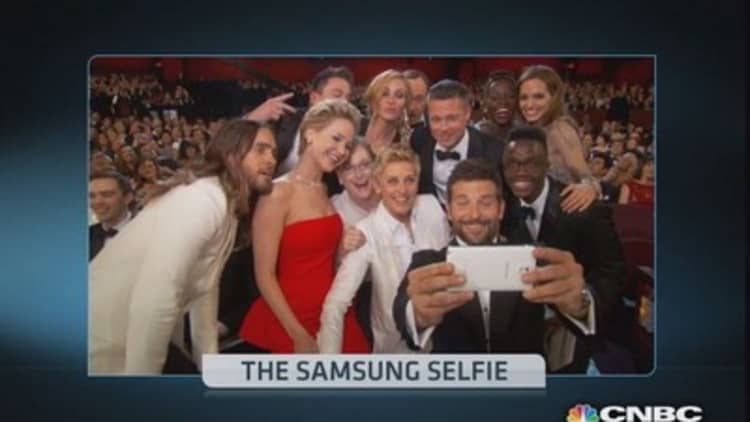3,399,090. That's the number of times (so far) that Ellen DeGeneres' infamous "Oscars selfie" has been retweeted.
That selfie – taken at this year's Oscars and featuring the likes of Meryl Streep, Jennifer Lawrence and Julia Roberts - is the most retweeted tweet in history. While the picture showcased the proliferation of the selfie in the global zeitgeist, it was notable for another reason: Bradley Cooper, who took the shot, was using DeGeneres' Samsung Galaxy Note 3.
It was a major coup for Samsung, and the latest way to publicize your brand: get celebrities to use your product - not in an advert - but in real life.
Read MoreEllen's Oscar' selfie' crashes Twitter, breaks record
According to The Wall Street Journal, Samsung spent $20 million on ads during the 86th Academy Awards, a figure Samsung declined to confirm.
However, the selfie was not part of the buy. Samsung said in an official statement it did not ask DeGeneres to take the picture. Rory O'Neill, the company's European marketing director, said Samsung saw the importance of allowing ambassadors like DeGeneres to use their phones "organically," rather than directing them.
"Yes, we sponsored the Oscars and yes, Ellen DeGeneres is an influential advocate and we provide devices to her. But in no way did we orchestrate or attempt to orchestrate what Ellen or any of our advocates do with our devices," he told CNBC by phone.
Eden Zoller, principal analyst, consumer practice at Ovum said the "Oscars selfie" was a gift for Samsung. She argued that, aside from price, branding was a key factor when people purchase a new phone.
"The Oscars was a dream come true," she said. "I think with smartphones all being fairly comparable it is about elusive branding; the cool factor that comes into play. The iPhone needs to barely advertise now because it had very slick and simple advertising originally."
The "Oscars selfie" came a few days after another smartphone manufacturer, HTC, launched the Desire 816. The company's chairwoman, Cher Wang, told CNBC that the phone would deliver "the world's best selfie."
Explaining the technology behind the selfie claim, Wang said that the front camera boasted 5 mega-pixels as well as built-in editing software to beautify selfies immediately.
Read MoreSmile! HTC aims to create the world's best 'selfie'
HTC has done something similar before. The HTC First was launched last April and dubbed the "Facebook phone," as it was the only Android handset to come with Facebook Home software. By May, AT&T announced it was discontinuing sales of the phone after a lack of interest.

Francisco Jeronimo, a research director for IDC, told CNBC the HTC's selfie phone was a risky move once more, highlighting the difficulty of monetizing a trend.
"They (HTC) are using something that is popular at the moment and trying to promote a phone," he said. "At the end of the day, a selfie application is not giving any original value to users. Users can take selfies with any phone."
He added: "The selfie became popular last year. It's popular now but I don't see it being popular next year. I don't see a strong value proposition. It can easily not trend in the future."
Ovum's Zoller agreed with Jeronimo, but argued that the selfie was not going to go away.
"I don't think selfies are going to go away. They are massively popular and it builds on current trends around social media," she said. "But I don't necessarily think that having phones that are optimized for taking selfies are going to ship by the millions."
Read More'Selfie' and 'phablet' added to the English dictionary
Selfie apps
At the Global Mobile Awards in Barcelona last month, a selfie application won the prize for "Most Innovative App." PointGrab created CamMe, a gesture-operated camera app, that allows customers to take selfies without pushing a button on their phone.
The app has been downloaded 1.5 million times so far according to Point Grab's Chief Marketing Officer Assaf Gad. However, he told CNBC the company never sought to focus on the selfie.
PointGrab started out using computer vision technology within products like televisions until last year, when Gad said "we wanted to expand into the mobile space and one of the ideas we had was CamMe. The idea was not to create monetization from this app; it was to get the attention of developers and original equipment manufacturers."
Clearly the app has attracted attention as well as funds for PointGrab, but does Gad not worry that making money from a trend is risky?
"We think that this application solves a real need: if you want to take a picture of yourself from a distance, this helps you to do that," he said. "People keep taking pictures of themselves. This is not just a trend that will pass by."
Zoller concluded that the "Oscars selfie" showed that brands and companies could utilize the trend to increase brand awareness – and coolness.
"I think this is probably one of the most immediate ways that brands could possibly monetize selfies.
"There are these possibilities around selfies which brands haven't explored deeply."
—By CNBC's Kiran Moodley. Follow him on Twitter @kirancmoodley

